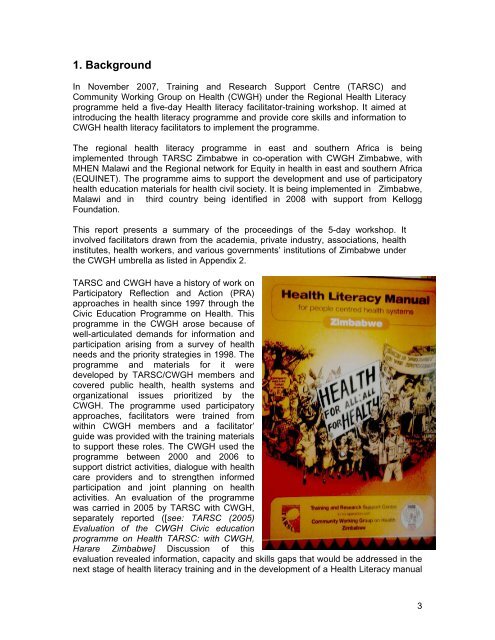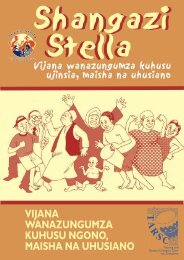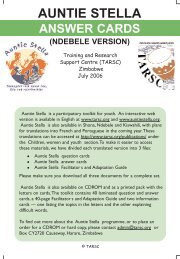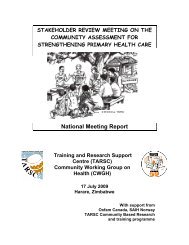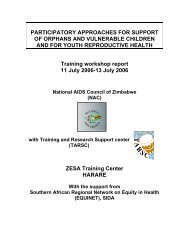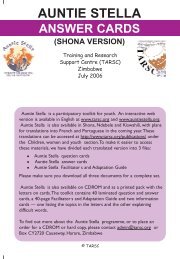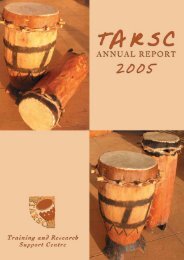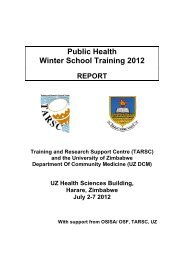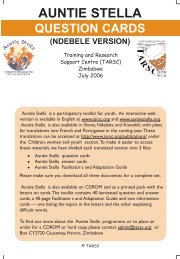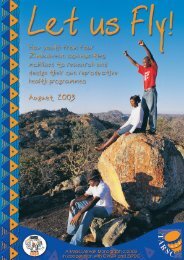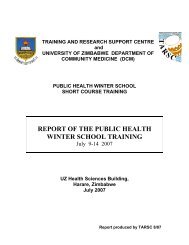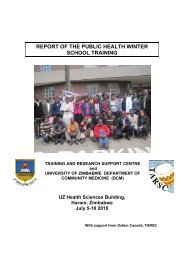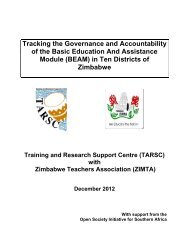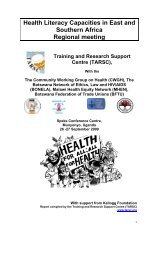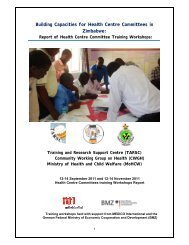HL sthnreg factng rep07.pdf - Training and Research Support Centre
HL sthnreg factng rep07.pdf - Training and Research Support Centre
HL sthnreg factng rep07.pdf - Training and Research Support Centre
Create successful ePaper yourself
Turn your PDF publications into a flip-book with our unique Google optimized e-Paper software.
1. Background<br />
In November 2007, <strong>Training</strong> <strong>and</strong> <strong>Research</strong> <strong>Support</strong> <strong>Centre</strong> (TARSC) <strong>and</strong><br />
Community Working Group on Health (CWGH) under the Regional Health Literacy<br />
programme held a five-day Health literacy facilitator-training workshop. It aimed at<br />
introducing the health literacy programme <strong>and</strong> provide core skills <strong>and</strong> information to<br />
CWGH health literacy facilitators to implement the programme.<br />
The regional health literacy programme in east <strong>and</strong> southern Africa is being<br />
implemented through TARSC Zimbabwe in co-operation with CWGH Zimbabwe, with<br />
MHEN Malawi <strong>and</strong> the Regional network for Equity in health in east <strong>and</strong> southern Africa<br />
(EQUINET). The programme aims to support the development <strong>and</strong> use of participatory<br />
health education materials for health civil society. It is being implemented in Zimbabwe,<br />
Malawi <strong>and</strong> in third country being identified in 2008 with support from Kellogg<br />
Foundation.<br />
This report presents a summary of the proceedings of the 5-day workshop. It<br />
involved facilitators drawn from the academia, private industry, associations, health<br />
institutes, health workers, <strong>and</strong> various governments’ institutions of Zimbabwe under<br />
the CWGH umbrella as listed in Appendix 2.<br />
TARSC <strong>and</strong> CWGH have a history of work on<br />
Participatory Reflection <strong>and</strong> Action (PRA)<br />
approaches in health since 1997 through the<br />
Civic Education Programme on Health. This<br />
programme in the CWGH arose because of<br />
well-articulated dem<strong>and</strong>s for information <strong>and</strong><br />
participation arising from a survey of health<br />
needs <strong>and</strong> the priority strategies in 1998. The<br />
programme <strong>and</strong> materials for it were<br />
developed by TARSC/CWGH members <strong>and</strong><br />
covered public health, health systems <strong>and</strong><br />
organizational issues prioritized by the<br />
CWGH. The programme used participatory<br />
approaches, facilitators were trained from<br />
within CWGH members <strong>and</strong> a facilitator’<br />
guide was provided with the training materials<br />
to support these roles. The CWGH used the<br />
programme between 2000 <strong>and</strong> 2006 to<br />
support district activities, dialogue with health<br />
care providers <strong>and</strong> to strengthen informed<br />
participation <strong>and</strong> joint planning on health<br />
activities. An evaluation of the programme<br />
was carried in 2005 by TARSC with CWGH,<br />
separately reported ([see: TARSC (2005)<br />
Evaluation of the CWGH Civic education<br />
programme on Health TARSC: with CWGH,<br />
Harare Zimbabwe] Discussion of this<br />
evaluation revealed information, capacity <strong>and</strong> skills gaps that would be addressed in the<br />
next stage of health literacy training <strong>and</strong> in the development of a Health Literacy manual<br />
3


